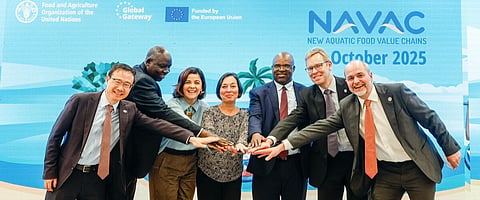

Launch of the NAVAC in Octoboer 2025.
Photo: FAO / Giuseppe Carotenuto
The Food and Agriculture Organization of the United Nations (FAO) and the European Union have launched a new €20 million initiative to improve access to safe and nutritious aquatic foods for vulnerable populations in Africa and Latin America.
The project, titled New Aquatic Food Value Chains for Sustainable Healthy Diets in Fragile Contexts (NAVAC), will run from 2025 to 2030 in Chad, Colombia, Guinea-Bissau, Mauritania and South Sudan. It seeks to increase the availability of affordable, sustainable aquatic foods while supporting local livelihoods through what FAO calls “Blue Transformation” innovations.
“The main aim of NAVAC is to expand the supply of sustainable, affordable, safe and nutritious aquatic foods and ensure that it reaches nutritionally vulnerable populations while at the same time providing economic benefits to local communities through Blue Transformation innovations in aquatic food value chains,” said Godfrey Magwenzi, Deputy Director-General of FAO.
The FAO emphasised that aquatic foods are a vital source of high-quality protein and micronutrients, playing an essential role in tackling malnutrition among children and pregnant or lactating women. However, the organisation notes that many national food and nutrition strategies still underestimate the potential of aquatic resources.
With this in mind, NAVAC supports FAO’s “Four Betters” framework - Better Production, Better Nutrition, a Better Environment, and a Better Life - and aligns with its "Blue Transformation" strategy to make aquatic food systems more efficient, inclusive and sustainable.
Annette Schneegans, Deputy Permanent Representative of the European Union to FAO, said the initiative “promotes innovative and integrated approaches to value chain development, from ‘net to plate’, ensuring that interventions advance food security and nutrition outcomes, strengthen livelihoods and enhance environmental sustainability.” She added that it reflects the EU’s commitment to its Global Gateway strategy, which focuses on tackling global challenges such as climate change and strengthening global supply chains.
FAO will implement the NAVAC project in partnership with the Technical University of Denmark. The first stage will involve analysing aquatic food value chains in the participating countries to identify gaps and opportunities. These findings will inform tailored strategies to boost the supply of healthy aquatic food to communities in need.
Building on lessons from the earlier FISH4ACP initiative - a joint FAO, EU and Organisation of African, Caribbean and Pacific States programme - NAVAC will combine research, innovation and local partnerships to combat both acute and chronic malnutrition while promoting resilient, sustainable aquatic food systems.
